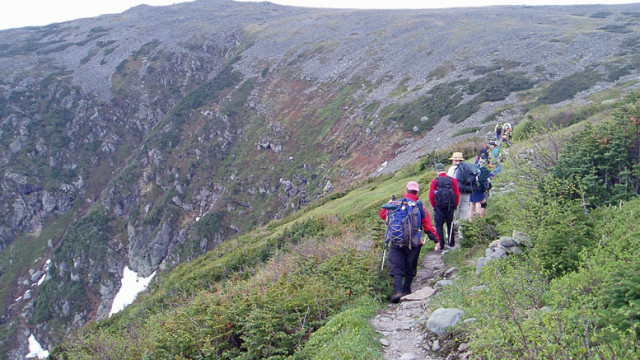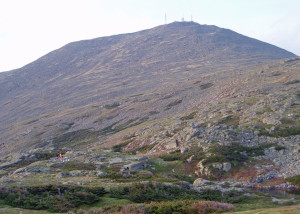
Another Death On Mount Washington
It’s possible, I suppose, that mountains are aware, and somehow intentionally influence events that happen on their slopes. In that case Agiocochook, A.K.A. Mount Washington in New Hampshire is a serial killer. In fact, the mountain has just “claimed” yet another human life. A press release from New Hampshire Fish and Game, the lead agency in all search and rescue operations in the state, describes the accident.
On Saturday, July 17, 2010, at approximately 5:00 p.m., Christopher Baillie, age 24, of Forked River, New Jersey, fell to his death while hiking Mt. Washington. Baillie and four friends were hiking on the Tuckerman Ravine Trail when Baillie went off the trail to the top of a waterfall. Baillie slipped on the rocks and was washed over the headwall, falling approximately 100 to 200 feet to his death.
Rescue personnel from the Appalachian Mountain Club (AMC), US Forest Service and New Hampshire Fish and Game Conservation Officers responded to the accident. The first rescuers to reach Baillie quickly confirmed that he was dead.
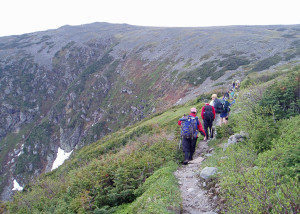
A slip, a fall, another body to haul down, another “victim” of the big mountain. Baillie is just the most recent of dozens who have died from falls in the Presidentials. For a reasonably-complete list of people who spent their last earthly moments in the White Mountains and how they died, visit the Mount Washington Observatory’s website. Fascinating reading. Once you’ve seen the lists there and are ready to pay attention, visit the HikeSafe website. I also highly recommend reading Nicholas Howe’s wonderful book Not Without Peril published by the AMC.
These sources just list the fatalities, not the close calls, the people who “got lucky,” and lived to tell about it. I imagine there are thousands of those stories . . .
Of course we all know that it’s humans, not mountains who are aware, and there was no “victim” here. The young man who died was just out having fun. He made a decision that, 9,999 times out of ten thousand would result in nothing more than another beautiful moment in a day filled with moments. But some combination of circumstances made this his last.
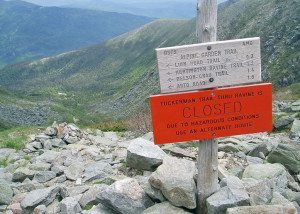
Maybe his bootsoles were worn, not able to grip the wet moss and water-polished rocks of a streambed. It happens. Maybe a passing breeze or a buzzing fly distracted him and he placed his foot wrong. It happens. We’ll never know the full truth, except that a young man fell and died. That’s truth enough, I suppose.
It’s easy to for some to say he shouldn’t have left the hiking trail. But it’s no great stretch from leaving the road to go hiking to leaving a hiking trail for a quick peek over a precipice. Same basic impulse. Without it, our lives would be pretty dull. Who’s to say anyone is wrong for seeking out adventure? Should we not get out of bed in the morning because it might be dangerous?
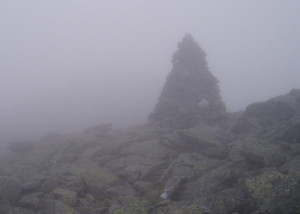
When you are on the Tuckerman Ravine Trail on Mount Washington, or any other trail on any other hill or mountain in the world, remember first of all, the mountain doesn’t care what happens to you any more than your bathtub cares when you take a shower. You are directly responsible for your own safety 24/7, wherever you happen to be. Saying you should be more aware and careful when you leave a hiking trail to go scrambling is like saying you should be more aware when crossing the street than walking on a sidewalk. It’s true, but masks the fact that there is need for awareness and appropriate caution in all places, at all times.
Don’t let the fact that a young man died keep you from hiking in high places. Just be aware, and do your best to keep yourself safe.
Busy Week For Search and Rescue
The Monday after Baillie died on Mount Washington, New Hampshire Fish and Game effected two successful search and rescue operations.
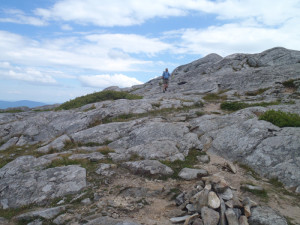
On Mount Monadnock in Jaffrey, N.H., two young hikers 15-year-old Cassandra Hailson and 18-year-old Mathew Correia, both of Salem, NH, got themselves lost in the woods shortly after beginning their descent from the summit around 2:30 p.m. The pair made contact by cell phone, which eventually gave searchers GPS coordinates of their approximate location. Two Conservation Officers located the hikers several hundred yards west of the Pumpelly Trail just before 9:00 p.m. and assisted the pair back to State Park Headquarters, arriving at 11:00 p.m. The hikers were in good spirits, but did not have food, water, or flashlights with them.
That same day, Fish and Game officers assisted an elderly man down from the summit of Mt. Chocorua. Richard Weeks, age 81 (hooray for him for climbing a mountain at age 81!), of Lynnfield, Mass., was hiking the mountain with his son’s family. The party set out about 11:00 a.m. and reached the summit, where Weeks became fatigued. His son stayed with him to walk out slowly after resting. The rest of the family hiked out on the Piper Trail. When it became clear that father and son would not be able to reach the trailhead before dark, they called for help. Conservation Officers hiked up the trail with flashlights and assisted Weeks, who was able to walk, and his son down the trail. They reached the trailhead about 12:30 a.m. Tuesday. Good for Mr. Weeks for making it out under his own power!
Regular readers know how I feel about heading away from the road unprepared – and in both these cases the hikers were not prepared. Carrying a cell phone does not prepare you for an emergency. If you need a list of what to carry EVERY TIME you leave the road, go here.
Remember, you are always responsible for your own safety and comfort wherever you are–especially when you are active outdoors.


